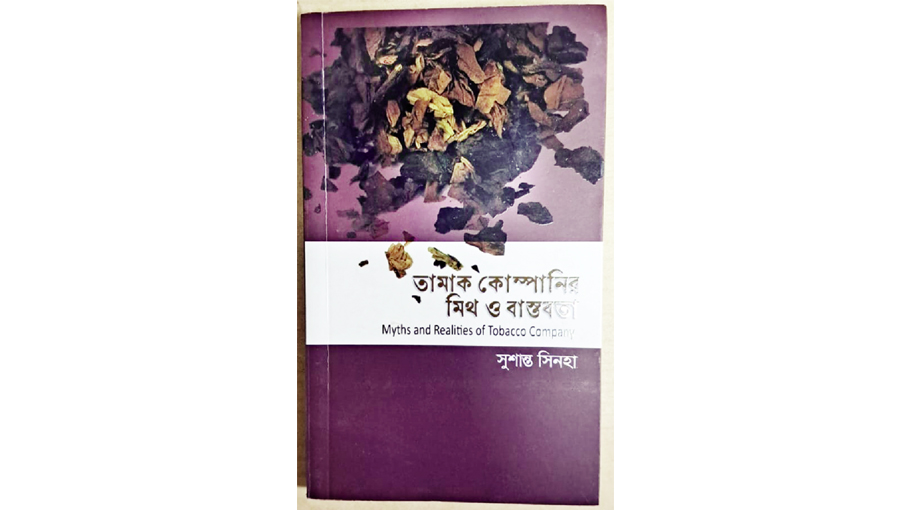Sushanta’s book discusses TC’s myths and realities

Tobacco companies apply various tactics, including myths and pricing strategies, to retain smokers, spread their products and weaken the impact of tobacco tax. Tobacco Company (TC) also applies tactics to evade government revenue. As a result, the increase in the tobacco tax is mostly absorbed.
Bangladesh is a country where tobacco use is still high. Although the rate of smokers decreases in the country in the last couple of years due to continuous efforts by the anti-tobacco activists and organisations, the number of tobacco users did not decrease as expected. In such a situation, it is now a big question whether it is possible to achieve the goal of making Bangladesh tobacco free by 2040, or not?
Meanwhile, the Bangladesh government is losing revenue of thousands of crores annually from the tobacco sector due to various tactics applied by the tobacco companies. However, the multinational companies are making billions of money in profit through revenue evasion and other kinds of financial irregularities regularly.
The book ‘Myths and Realities of Tobacco Company’ by Sushanta Sinha discusses the issues. It presents detail the facts and data on the tobacco industry gathered from a research. The writer, Sushanta Sinha who is a researcher on tobacco control and special correspondent of Ekattor TV, carried out the study in 2021 and later authored the book based on the findings. The 102-page book has been published in Bengali and English by Magic Lanthon Prokashon in Rajshahi of Bangladesh. The cover price of the book is BDT 120.
The book will provide readers with an in-depth understanding to tobacco control, the tactics used by multinational tobacco companies, their intervention to policies and propaganda in various ways. The book will help both the tobacco control advocates and policymakers to enrich their knowledge over the economic myths regarding tobacco and their realities. The myths are mainly perpetuated by the tobacco companies.
Sushanta Sinha in his book discussed the myths and realities in different points which include-- tobacco companies’ financial irregularities; their tactics over financial transactions; policy influence; use of CSR as promotional tool by tobacco industry; leading tobacco company’s various tactics and influence over market expansion and tax evasion.
In the background, the book discusses present condition of tobacco prevalence in Bangladesh. Economic improvement of the country, life expectancy, and rising trend of non-communicable diseases (NCDs) and consumption of tobacco products as one of major causes of such diseases are discussed in the background.
Like many other countries, tobacco companies use a variety of pricing strategies in Bangladesh to achieve profit. How the complex in tobacco taxation as well as multi-tier tax structure and prices of different tiers of cigarette benefit the tobacco industry rather than the Bangladesh government is discussed in the book in detail with evidence.
British American Tobacco Company (BATB) is the main beneficiary of such a complex. At present, the BATB controls about 65 per cent of the production and marketing of all-tier cigarettes in Bangladesh. The leading tobacco company in Bangladesh could multiply its profits while maintaining the affordability of its products due to the ad-valorem tax structure.
“In Bangladesh, low-tier cigarettes account for 75 per cent of sales. Still revenue collection from these is poor as the base prices of low-tier cigarettes are very minimal and the tax rate is lower than that of upper-tier cigarettes. Meanwhile, profits in this tier are highly lucrative. British American Tobacco Company (BATB) aggressively moved to capture the lower-tier cigarettes,” Sushanta Sinha writes in the book.
There is an assumption in Bangladesh that multinational companies don’t engage in financial irregularities. However, the tobacco companies, including the BATB, are involved in financial irregularities which came in the book with evidence. Sushanta Sinha in his book places evidence of irregularities through step-by-step verification of documents.
The research analyses the financial reports and transactions of BATB between 2011 and 2020 to examine anomalies. BATB’s CSR activities were also examined after collecting data from National Board of Revenue (NBR), the apex authority for the tax administration in Bangladesh, national and international media and different anti-tobacco platforms.
It was found that by applying various tactics, the BATB has been able to promote the myth that they have the largest CSR portfolios and that millions of people benefited through it very successfully to the public and the government policymakers.
BATB sends foreign currency abroad in various ways. If the company did not send such a huge amount to their mother company, the money would be added to the company’s profit. “As a result, the government would get a 47.5 per cent corporate income tax and shareholders would get more dividends on that money,” Sushanta Sinha writes in the book.
The book says, BATB has appointed a total of eight secretaries on the board of directors in ten years. It is uncommon for a multinational cigarette firm to have so many directors with so little ownership at top level of policymaking. The members of BATB board work to influence tobacco policy.
After discussing the issues of TC’s myths and realities in several points, Sushanta Sinha placed a seven-point recommendation at the end of the book.




